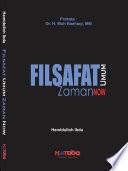Filsafat sebagai induk dari semua ilmu atau the mother of sciences menjadi diktum urgensi yang mendasari untuk melakukan penguatan pemahaman, pendalaman, dan penelitian objektif secara kontinu tentang studi filsafat. Filsafat umum sebagai salah satu kajian keilmuwan yang dijadikan nomenklatur mata kuliah tidak sekadar berisi ilmu, teori, konsep (tasawwur), bahkan kredo yang bertele-tele. Lebih dari itu, filsafat merupakan induk dari semua ilmu yang membuka cakrawala berpikir dari konseptual hingga implementatif. Tidak ada landasan pengembangan ilmu yang lepas dari filsafat. Semua perguruan tinggi, dari yang ekstrem kanan, moderat dan kiri, semua butuh filsafat. Untuk itu, penulis ingin fokus mengembangkan kajian filsafat umum sebagai salah satu bahan untuk meneliti, mengembangkan dan membongkar hal-hal baru, khususnya di era Revolusi Industri 4.0 ini yang memang sarat akan ketercerabutan (disruptive, disruption). Perubahan besar, sangat ditentukan dari perubahan cara berpikir. Pola dan cara berpikir benar, baik, dan indah, maka akan menentukan perkataan dan perbuatan, bahkan putusan benar, baik dan indah, begitu sebaliknya. Urgensi filsafat sebagai the mother all of sciences menjadi landasan bagi perkembangan pikiran manusia. Lewat sumber daya berkualitas, maka akan mampu menjawab tantangan era Revolusi Industri 4.0 ini. Apalagi, keharusan kita di abad 21 ini tidak sekadar dituntut memiliki “kompetensi, karakter dan literasi” yang hanya pada literasi lama. Mulai dari membaca, menulis, dan berhitung. Revolusi Industri 4.0 mengharuskan kita memiliki bekal literasi baru, yaitu literasi data, teknologi, dan sumber daya manusia (humanisme). Di situlah tampak jelas, filsafat selalu relevan dalam kehidupan manusia. Filsafat umum mencakup kajian tentang persoalan kesatuan, keseragaman, serta hubugan di antara segenap ilmu. Kajian ini terkait dengan masalah hubungan antara ilmu dengan kenyataan, kesatuan perjenjangan, susunan kenyataan, dan sebagainya. Filsafat ilmu khusus, yaitu kajian filsafat ilmu yang membicarakan kategori-kategori serta metode-metode yang digunakan dalam ilmu-ilmu tertentu atau dalam kelompok-kelompok ilmu tertentu, seperti dalam kelompok ilmu pendidikan. Seiring berkembangnya roda kehidupan yang sekarang sudah sampai abad 21 yang dikenal sebagai era milenial yang dari beberapa definisi, “generasi milenial” didominasi mereka “Generasi Y” (generasi yang lahir di atas tahun 1980-an - 1997). “Generasi Y“ ini merupakan eranya mereka yang hidup setelah “Generasi X”. Generasi milenial, juga sudah selesai karena sekarang eranya sudah “Generasi Pascamilenial” yang dikenal dengan “Generasi Z” (generasi yang lahir dalam rentang tahun kelahiran 1995 sampai 2014). Setelah “Generasi Z”, sekarang sudah mulai datang “Generasi Alfa” (generasi yang lahir setelah tahun 2010 dengan usia paling tua adalah anak-anak usia 5 tahun). Satu akar kata dengan kata “alfa” adalah “Alfatihah”, “Alfabet”, “Alfanumerik” dan kata atau idiom “Alfun”. Alfatihah merupakan ummul kitab, surat pembuka dalam Alquran. Sementara alfa merupakan nama huruf pertama abjad Yunani, bisa berarti yang pertama, permulaan. Sedangkan alfabet adalah abjad. Makna dari alfanumerik sendiri berarti rangkaian aksara yang dapat terdiri atas huruf, angka, tanda baca, atau lambang Matematika. Dari definisi dan analisis generasi ke generasi secara rumus konvensional-digital di atas, bisa dipetakan bahwa generasi milenial (Generasi Y), kemudian generasi Pascamilenial (Generasi Z), dan Generasi Alfa, adalah mereka yang hidup dan duduk di bangku SD/MI, SMP/MTs, SMA/SMK/MA bahkan mahasiswa. Mereka merupakan generasi yang hidup dalam “benua maya” dan dalam lingkungan internet. Untuk Generasi Alfa sendiri dalam konteks ini, bisa dikatakan sebagai generasi wahid, pertama, awal, lalu pembaharu, pemula, pelopor, generasi pertama setelah generasi yang ada sebelumnya, dan mendominasi kehidupan, terutama di dunia pendidikan. Buku ini merupakan bahan ajar kuliah yang dalam penyusunannya, penulis menggunakan riset perpustakaan atau kajian pustaka, serta kajian empirik lapangan, khusunya di dunia pendidikan. Bab pertama, mendekonstruksi ilmu, filsafat, dan agama. Bab kedua, mengkaji ruang lingkup filsafat. Bab ketiga, membedah filsafat manusia. Bab keempat, menguliti konsep diri (self concept) dalam perspektif filsafat. Bab kelima, membedah akal-badan, dan relasi keduanya. Bab keenam, mengkaji manfaat, implikasi filsafat, dan hubungannya dengan bidang ilmu pendidikan. Bab ketujuh, membedah metodologi dan klasifikasi filsafat ilmu dari para filsuf. Bab kedelapan, membahas perkembangan ilmu. Bab kesembilan, membahas hubungan antara ilmu dengan value (nilai). Bab kesepuluh, membahas relevansi nilai-nilai Islam bagi pengembangan ilmu. (*)
Filsafat sebagai induk dari semua ilmu atau the mother of sciences menjadi diktum urgensi yang mendasari untuk melakukan penguatan pemahaman, pendalaman, dan penelitian objektif secara kontinu tentang studi filsafat.










